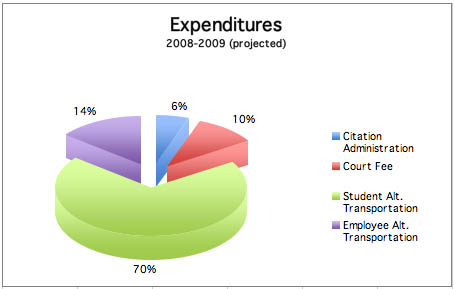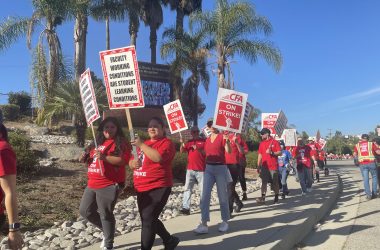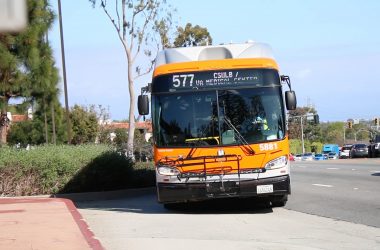Neal Schermesser had no idea other students’ parking tickets were paying for him to get to campus.
Schermesser, a sophomore civil engineering major, takes the shuttle to school because he does not have a car. And at Cal State Long Beach, the money received from parking tickets funds the shuttle program.
“It’s definitely an interesting way of raising the funds,” Schermesser said. “I mean, nobody likes parking tickets. I guess it’s a good way to use the money.”
It turns out it’s not just a good way to use the money — it’s the law.
The California Education Code mandates that State University parking fine revenues “shall be used exclusively for the development, enhancement and operation of alternate methods of transportation programs for students and employees.”
The money may also be used “for the mitigation of the impact of off-campus student and employee parking in university communities, and for the administration of the parking fines and forfeitures programs.”
Thus, ticketed drivers at CSULB are funding the alternative transportation programs offered by the college, including the shuttle program, U-PASS and the employee rideshare program. Many students said they were not aware of this.
Michelle Columbus, a senior human development major, said she thinks it is good that the money goes to alternate transportation.
“I actually didn’t know where it went, but I didn’t think that it benefited us in any way,” she said. “I think that’s actually good.”
CSULB collected about $926,000 from parking tickets in the 2006-2007 fiscal year and about $1,100,000 in 2007-2008. For this fiscal year, 2008-2009, the department anticipates it will collect about $1,200,000.
The reason for the increase is not that the school is giving out more tickets, but rather that parking fines were raised in the middle of fiscal year 2007-2008, said University Police Chief Stan Skipworth.
“It’s important that … there’s an appropriate level of fine to discourage people from intentionally committing a parking offense,” Skipworth said.
Once the money is collected, it is used for a variety of purposes. About 6 percent to 7 percent of it goes toward administration of the program — that is, receiving and processing the citations.
The school must pay a fee to the courts for any necessary handling of parking tickets, which accounts for 10 percent to 13 percent of the money.
The lion’s share of the fines and forfeitures money, however, goes to alternate transportation, as mandated by the law.
CSULB splits this money into two categories, one for students and one for employees. The student program receives the largest portion of the fines and forfeitures budget. This year the student category is projected to get about $967,000, or 70 percent.
Most of this money pays for the shuttle program on campus. The campus contracts with Diversified Transit to provide 24 shuttles that travel nine routes, said Elissa Thomas, rideshare coordinator at CSULB.
According to CSULB’s records, there were approximately 114,000 boardings on the shuttles in October, an average of about 5,000 each day.
Some students said they appreciated the shuttles.
“I think they’re handy,” said Courtney Simmer, a senior biochemistry major who rides the shuttle every day.
A common complaint, however, is that the shuttles are sometimes too crowded.
“There’s times where I’ve had to wait more than once because a bus has been too full with students,” said Anthony Bribiesca, a senior kinesiology major.
About 20 percent of the money in the student category this year went to the U-PASS program, which allows students, faculty and staff to ride Long Beach Transit for free by swiping their CSULB identification card through the bus’ fare box.
The employee program is slated to receive about $200,000, or 14 percent, of the fines and forfeitures budget this year.
Employees can earn a rideshare point, worth $1, each day they use an alternative method of transportation. The rideshare points can be redeemed for Beach Bucks and gift cards.
Katy Kroll, executive assistant to the deans of the College of the Arts, lives close to campus and often bikes or rides the bus.
“I just love riding my bike in the morning,” she said. “It’s a good way to sort of start the day.”
Kroll gets Beach Bucks from the rideshare program and uses them to take her friends out to lunch or to shop at the bookstore.
Many students said they thought it was good that the fines and forfeitures money was used to fund alternative transportation.
Stephanie Hernandez, a junior criminal justice major, said she got several parking tickets last year for not displaying a permit. She had no idea that the money went to alternative transportation, but said it definitely made her feel better about her tickets.
“It’s a good thing,” she said. “I mean if it’s going for a good cause then … I don’t mind paying for the consequence of breaking the law.”





The campus community knows so little about the Department of Parking and Access Services and its contributions to the campus. Thank you for the well written article Laura.